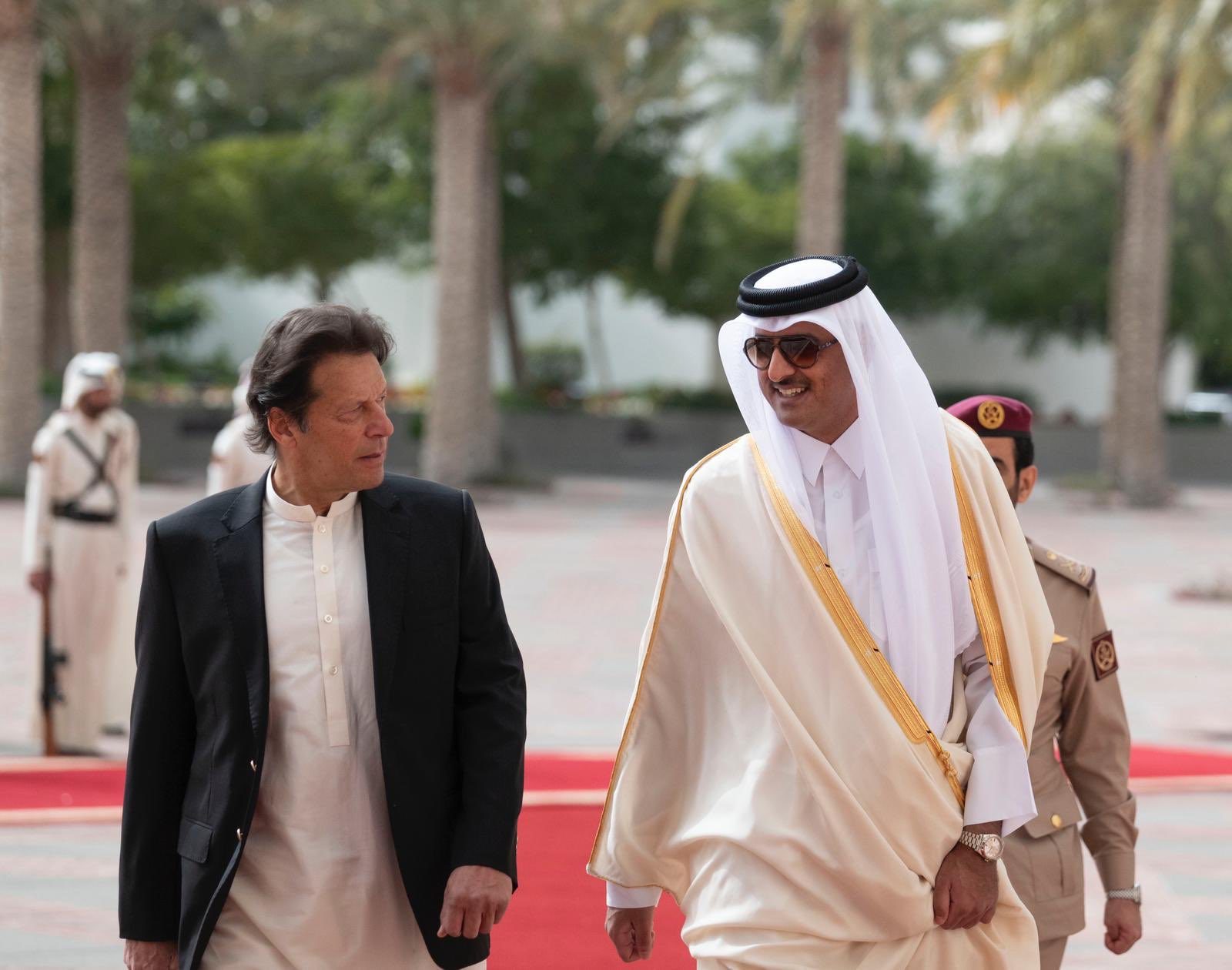A recent deal between Doha and Islamabad to buy three million tonnes of liquified natural gas [LNG] has raised questions on the political and diplomatic front, experts believe.
Qatar Petroleum and Pakistan signed a major 10-year LNG deal on Friday, the “lowest publicly disclosed liquified gas contract in the world”.
Pakistan’s Prime Minister Imran Khan, who also attended the signing ceremony, stated that the latest deal is “significantly lower” than the previous one signed in 2015 in the presence of former Prime Minister Nawaz Sharif.
“The new contract will help save the country $300 million annually or nearly $3 billion in the next 10 years,” announced Khan.
Read also: Intra-Afghan talks resume in Qatar amid Kabul escalations
The new agreement will enable Pakistan to purchase three million tonnes of LNG per year from Qatar at around 31 per cent lower rate than the previous contract. According to special assistant to prime minister on Petroleum, Nadeem Baba, Pakistan will now pay up to $316 million less compared to the prior agreement.
The deal—signed between Qatar Petroleum and Pakistan State Oil Company Limited [PSO] – will begin from January 2022 with an average of two ships delivering the gas per month and will later be increased to four in the upcoming three years.
“With a well-established gas market and distribution system, Pakistan is a strategically important market for Qatar LNG,” said Qatar’s Energy Minister Saad Sherida al-Kaabi, who signed the contract.
‘A new bloc’
Analysts believe that the latest growth of ties between the two states is “another indication of the emergence of a new kind of camaraderie” as Pakistan begins to shift away from its reliance on Saudi Arabia and the UAE.
Speaking to Doha News, Associate Professor of Political Science at Qatar University Dr. Farhan Chak said this is also suggests the formation of a new bloc between Pakistan and countries that hold similar policies.
“The relations between Turkey and Qatar are strong, as are relations between Turkey and Pakistan. It was only really a matter of time that these three got closer together, said Dr. Chak.
“There will be more more countries that will join this alliance because there’s a lot of things that these countries have in common,” he added.
Like Pakistan, Qatar and Turkey are two of the countries that have repeatedly refused to normalise with Israel without the added step of recognising Palestine as a country, with Jerusalem as its capital.
Commenting on the wave of normalisation in the region, Dr. Chak believes that there has been a divide in the broader Middle East, with countries that are following the footsteps of the UAE and Bahrain in signing the Abraham Accords.
There has also been pressure by Saudi Arabia, a country that shares strong relations with Pakistan, for Islamabad to normalise with Israel, Dr Chak suggested.
However, this attempt to coerce it into normalising ties has so far been denied by authorities in Islamabad, despite the strength of relations with the Saudi kingdom.
When Saudi Arabia, the United Arab Emirates, Bahrain and Egypt imposed a land, air and sea blockade on Qatar, the kingdom also prodded Pakistan to join in, to no avail.
“This has made Saudi Arabia angry because of the considerable financial support that it has given Pakistan…and this is why we’re finding Pakistan and Qatar moving closer together and at the same time, Saudi Arabia and the UAE are moving farther away from who I would consider, their traditional allies,” said Dr. Chak.
“The GCC right now is almost non-existent as a political identity, it is not functioning that way anymore,” he added.
Despite the recent signing of the Al Ula reconciliation declaration, the region remains divided without united policies, the expert added. This means neighbouring countries are likely to become more competitive on the political front, with the UAE and Saudi Arabia vying to regain Pakistan’s trust for their own interests.
Qatar-Pakistan ties
Beyond economic deals, Qatar and Pakistan’s ties have recently appeared to be growing closer. In recent days alone, several meetings and visits between diplomats and military officials, including Pakistan’s Chief of the Army Staff General Qamar Javed Bajwa, have taken place between the two countries.
The two countries also signed several memoranda across different sectors in recent years, including tourism, business and defence, with Pakistan offering to provide Qatar with security for the FIFA World Cup 2022.
Qatar and Pakistan share a decade-long defence cooperation deal that was signed in 1983, enabling joint training and exercises between the two countries, with many Pakistani nationals serving in the Gulf state’s Armed Forces.
Read also: Qatari FM meets EU ambassadors in bid to revive nuclear deal
But going beyond, Qatar and Pakistan have cooperated to ensure regional stability, most notably in the historic intra-Afghan talks that aim to end decades of war between the Afghan government and the Taliban.
Marking the resumption of the stalled talks this month, Special Envoy of Foreign Minister of Qatar Dr Mutlaq bin Majed Al-Qahtani held meetings with Pakistani officials to discuss the latest developments in the ongoing peace talks..
Islamabad’s Foreign Minister Shah Mahmood Qureshi stressed that peace and stability in Afghanistan is in the interest of Pakistan, adding that his country believes in dialogue as the war in Kabul cannot be resolved with military action.
Al-Qahtani and Bajwa also discussed with the Qatari official the facilitation of the intra-Afghan talks.
Pakistan played a significant role in mediating the Afghan talks, as well as those between the US and the Taliban, the most prominent of which was the 2+2+1 or the Murree Peace Process.
Follow Doha News on Twitter, Instagram, Facebook and Youtube







